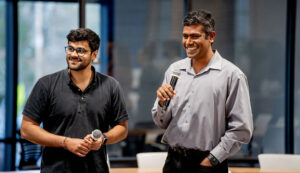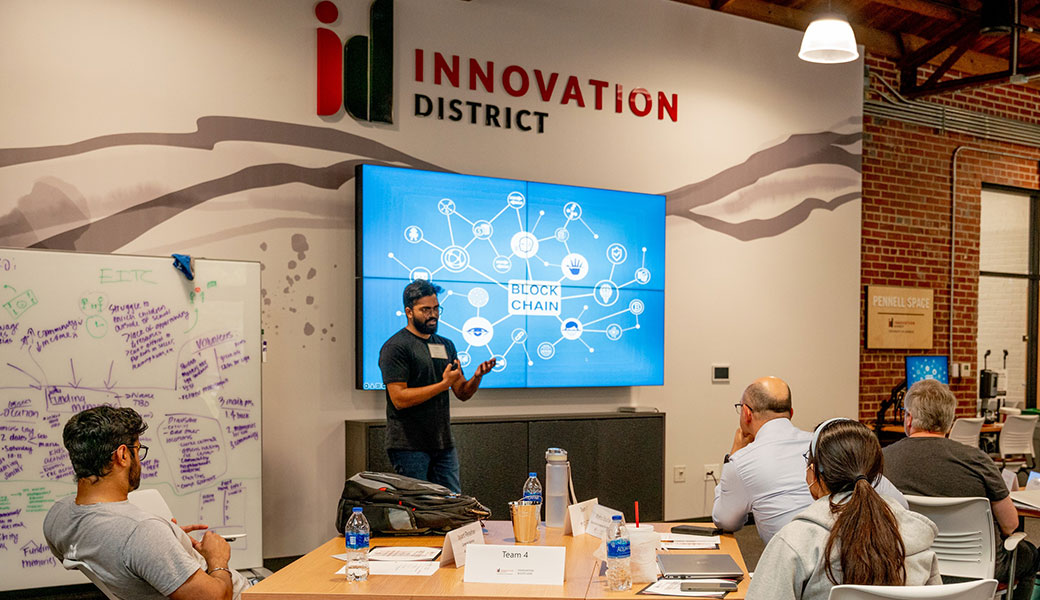At the University of Georgia’s Delta Innovation Hub, students and faculty are building businesses with help from legends from their industry.
As a part of UGA’s Innovation District, the Innovation Bootcamp is offered twice a year to students and faculty who want to learn how to successfully turn research into products and solutions. The current session of the Bootcamp was designed specifically for entrepreneurs in computing and computer science.
“UGA doesn’t have as many computer science and computing-related startups as we’d like, and we wanted to increase our support for people in these fields,” said Allyson Hester, program manager for Innovation Bootcamp. “Computing power touches every industry, and we designed this Bootcamp to include innovators from across the university.”
The seven-week program uses a mixture of learning sessions, group projects and one-on-one coaching to teach innovation and business. Attendees learn how to gain access to early-stage funding, work on refining their product or idea, and pick up skills to help build an effective team. As the group studies the process of commercializing research, keynote speakers and experts join them to share knowledge and insights.
On March 23, Bootcamp premiered a documentary about General Magic, an early software and electronics company often referred to as “the most influential Silicon Valley company no one has ever heard of.”
Originally a part of Apple, General Magic was spun off into its own company in 1990. Before failing as a business, its ideas dominated the tech industry, and it employed early pioneers in the computer industry, including the creators of the iPhone, Android and eBay.
General Magic is responsible for creating precursors to the USB standard and multimedia emails, as well as shipping its first handheld personal communicator or “smartphone” in 1994.

After watching the documentary, the bootcampers spoke with a panel of experts including Michael Stern, former legal counsel for General Magic and an executive producer of the film. The panel also included Dee Gardetti, the former head of human resources for the company; Matt Maude, the film’s director; and Veronica Miles, the impact producer of the film.
When asked what could have been done to prevent the business failure of a company that produced so many great ideas, Stern replied, “We needed to ship faster. We worked so hard on making our product perfect that we delayed shipping too long. A product doesn’t need to be perfect in the beginning—it just needs to have demand.”
UGA’s newest cohort of entrepreneurs will learn to tackle a similar challenges as they try to take academic research and apply it to the marketplace.
One of the attendees, Thirimachos Bourlai, is an associate professor in the College of Engineering and was drawn to the program soon after he joined the university in 2020.
“I met with Ian Biggs [director of startups for Innovation Gateway] when I joined UGA and was very interested in everything going on over there. It’s an exciting time to be involved in a program that aims to introduce attendees to the key skills needed for success in an innovative, entrepreneurial environment,” said Bourlai. “I heard about the program and wanted to learn about the basics of research commercialization and pass this experience and excitement to my students.”
As the founder and director of the Multi-Spectral Imagery Lab, Bourlai’s research focuses on developing technology for supporting, confirming and determining human identity in challenging conditions. Primarily using facial images, his research also uses other biometric modalities like the iris, heart signatures, fingerprints, palms, ears and tattoos.
Currently he is working on several projects funded by the Department of Defense and the Department of Justice. These projects range from the collection of large-scale biometric datasets to the development of new human identification algorithms that use ear and face data for identification when subjects are wearing masks.
“Advanced artificial intelligence that uses machine learning and deep learning is a growing field. In my lab, we are working on projects supported both by the government and the industry,” Bourlai said. “It is very important as research scientists to have the opportunity to step out of the academic world whenever we can and be excited and learn more about the best steps we need to take to potentially commercialize our work. There is no better way to do that than by learning these steps from the great team of the Delta Innovation Hub at UGA.”
After the program is completed, Innovation Gateway continues to support bootcampers and help them turn their research discoveries into commercial success. For those who wish to go deeper and turn their ideas into a full-fledged business, programs like I-Corps and co-working spaces at the Delta Innovation Hub are available.
The next Innovation Bootcamp will launch in the fall of 2022 and focus on diversity, inclusion and equity among beginning entrepreneurs.






